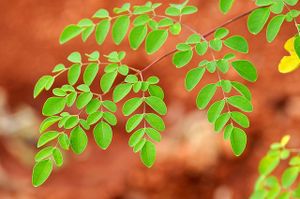Note: This is a project under development. The articles on this wiki are just being initiated and broadly incomplete. You can Help creating new pages.
Moringa oleifera - Drumstick
Moringa oleifera [1] is the most widely cultivated species of the genus Moringa, which is the only genus in the family Moringaceae. English common names include: moringa, drumstick tree(from the appearance of the long, slender, triangular seed-pods), horseradish tree (from the taste of the roots, which resembles horseradish), ben oil tree, or benzoil tree(from the oil which is derived from the seeds). It is a fast-growing, drought-resistant tree, native to the southern foothills of the Himalayas in northwestern India, and widely cultivated in tropical and subtropical areas where its young seed pods and leaves are used as vegetables. It can also be used for water purification and hand washing, and is sometimes used in herbal medicine
medicinal uses
- Leaves rubbed against the temple can relieve headaches.
- To stop bleeding from a shallow cut, apply a poultice of fresh leaves.
- There is an anti-bacterial and anti-inflammatory effect when applied to wounds or insect bites.
- Extracts can be used against bacterial or fungal skin complaints.
- Leaf tea treats gastric ulcers and diarrhoea.
- Eating Moringa food products is good for those suffering from malnutrition due to the high protein and fibre content.
- Leaves treat fevers, bronchitis, eye and ear infections, inflammation of the mucus membrane
- The iron content of the leaves is high, and they are reportedly prescribed for anemia in the Philippines.
- Dried Moringa leaves treat diarrhoea in Malawi, Africa.
- The powder ground from the seeds is also used in the treatment of scurvy skin diseases (common bacterial infections of the skin).
References
- ↑ Cite error: Invalid
<ref>tag; no text was provided for refs namedGloriosa
Cite error: <ref> tag with name "Moringa oleifera" defined in <references> is not used in prior text.
